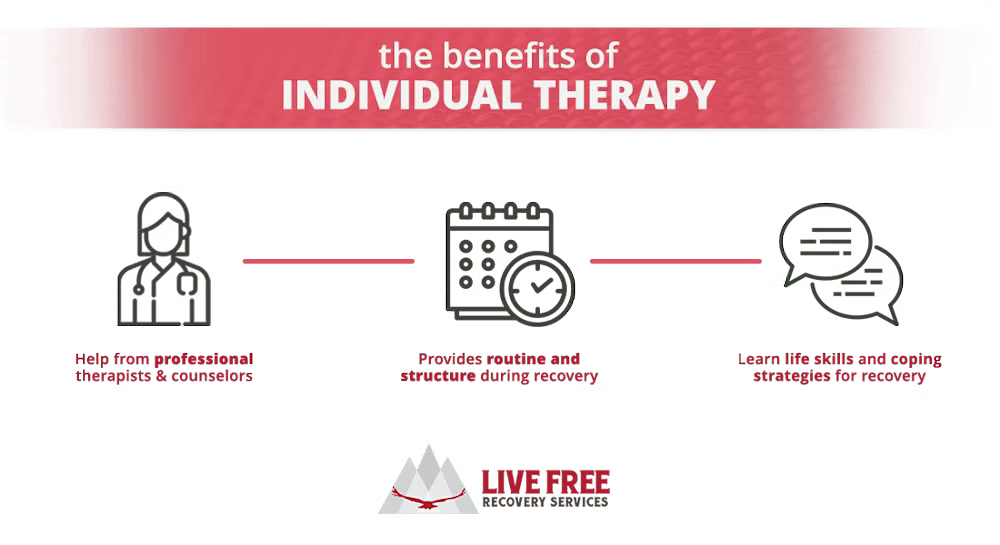Individual Therapy in New Hampshire
Therapy is a crucial component of addiction treatment.
Therapy is a crucial component of addiction treatment. Therapy allows those in treatment to work through their problems and better understand how they ended up in therapy in the first place. It is also a great way to learn new ways of handling stressors and emotions that don’t involve turning to drugs or alcohol.
One of the therapies that are utilized in addiction treatment is individual therapy. This page will be dedicated to everything you need to know as it pertains to individual therapy in New Hampshire.
What Is Group Therapy?

What Is Individual Therapy?
As the name implies, individual therapy is a form of addiction therapy that is conducted in a private one-on-one setting. Unlike group therapy which centers around that support group environment, individual therapy is much more intimate.
Individual therapy is designed to complement group therapy. Oftentimes, topics that are discussed in group therapy are also discussed in individual therapy with the therapist being able to do a deeper dive.
Since individual therapy is conducted by the same therapist or counselor every time, it allows the person who is in therapy to build up a level of trust that will allow them to open up and break down any mental walls that they might have put up. The trust that is built up during individual therapy allows the person who is in therapy a safe, non-judgmental space to share anything they might want to talk about.
Since many people who suffer from addiction also suffer from a mental health disorder as well, individual therapy allows the therapist or counselor to spend more time working with the person in therapy on the issues specifically going on with them.
What Are The Benefits of Individual Recovery?

The ultimate goal of individual therapy is to better understand how your addiction developed and learn healthy ways to handle possible triggers in the future. As is the case with many other things in life, the more you put in the more you get out. In fact, there are many significant benefits to actively participating in individual therapy sessions.
Learning About Your Triggers
Nobody who is suffering from addiction just woke up one morning and decided that they were going to become addicted to drugs or alcohol. Something triggered them to start using. Understanding what those triggers were is crucial to the overall recovery process. After all, the only way to be able to truly stop using drugs and alcohol is to learn why you started in the first place.
Learning what your triggers are and how to work through them in a healthy manner is a vital step in the recovery process.
Learning About Yourself
Another benefit of individual therapy is it provides a safe space for you to break down the walls and truly get to the bottom of what might have led to your addiction. Addiction is just as much mental as it is physical.
Individual therapy allows both the therapist and the person who is in therapy to develop the rapport needed to confront issues that might have been buried through the use of drugs and alcohol. Addressing these issues not only gives you a chance to learn more about yourself, but it also gives you a better understanding of how your addiction might have developed as well as how to address these issues in the future in a more healthy way.
Practicing Mindfulness
Mindfulness is one of the tools that is used by therapists and counselors during addiction treatment. Mindfulness teaches us to live in the moment and accept life for that it is. By practicing mindfulness you can be better equipped to deal with any triggers as they occur. It will also allow you to calm yourself down in any type of stressful or upsetting situation instead of turning to drugs or alcohol.
Better Communication Skills
Suffering from addiction can be a dark and lonely time. For many people, their friends and family don’t want to be around them anymore and the only people that do are others who are also using. As a result, one of the things that those in recovery have to work on is learning how to communicate with people again.
Communication is one of the areas individual therapy works to improve. Individual therapy is a great way for a person who is in recovery to work on learning how to communicate again in a productive and healthy manner.
What Happens In An Individual Therapy Session?
As touched on above, an individual therapy session takes place in a one-on-one environment. In order to promote a safe and supportive environment, a person will often meet with the same therapist each session. This builds the relationship needed to peel back the curtains and get to the bottom of what led to the development of the addiction.
Unlike group therapy where the topic is picked by the therapist or counselor leading the session and everyone takes turns speaking, individual therapy is designed to address the specific issues and needs of the person in therapy. Individual therapy is also the setting to discuss anything that you might not feel comfortable talking about in a group setting.

What Are the Different Types of Individual Therapy?
Just as everyone’s addiction is unique to them, so is their treatment. This includes therapy. As a result, there are many different types of therapies that a therapist or counselor might tap into based on what they feel is best for the needs of the person in therapy.
The most popular type of treatment used in individual therapy is behavioral therapy. Behavioral therapy helps get to the bottom of how the addiction developed. By learning what triggered the addiction, you can then work on healthier and more productive ways to deal with those triggers in the future.
Some examples of behavioral therapy that are used in addiction treatment include:
- Cognitive behavioral therapy (CBT)
- Dialectical behavioral therapy (DBT)
- Acceptance and commitment therapy (ACT)
- Psychotherapy
- Motivational Enhancement Therapy
What’s the Difference Between Individual and Group Therapy?
Group therapy and individual therapy are designed to complement one another. That being said, there are some significant differences between the two.
For starters, group therapy is designed to provide peer support. Group therapy allows those who are in recovery to come together all with the common goal of getting and remaining sober. It also provides an environment for people to share their experiences with others who may have gone through something similar and can help by sharing their own experiences.
On the other hand, individual therapy is much more intimate. It takes place in a one-on-one environment and oftentimes you meet with the same therapist each session. Since each session is one-on-one it allows you to focus specifically on yourself and your needs and provides a safe space to share things that you might not feel comfortable talking about in a group setting. Individual therapy also allows you to take a topic from a group session and spend more time on it.
Is Individual Therapy Needed After Treatment Has Been Completed?
Recovering from addiction and maintaining your sobriety is a lifetime battle. It requires daily effort even after treatment has been completed. Many people choose to continue therapy on their own even after they have completed treatment and gone back to their daily lives.
While the need and desire might slow down over time, individual therapy post-treatment can be a great tool for assessing where you are at in your recovery and working on making any necessary adjustments to maintain your sobriety.
Are You Looking For Individual Therapy in New Hampshire?
Individual therapy is an important tool in the recovery process both during and after addiction treatment. Not only can it help you learn more about yourself and shed some light on how your addiction started, but it can also help teach you ways to better handle triggers in the future.
At Live Free Recovery we know the importance of therapy in the overall treatment process. That’s why we offer a variety of therapy options, including individual therapy. For more information about the therapies that we offer, including individual therapy, or about how we can help you or a loved one get the help that they need, contact us today. We want everyone that walks into our facility to leave and go on to live a happy, healthy, and sober life.
Did this article answer your questions?
"*" indicates required fields
Take the First Step Towards a Brighter Tomorrow
At Live Free Recovery, we’re committed to walking alongside you on every step of your journey. Our compassionate team is here to provide the guidance and support you need to overcome addiction and reclaim your life. Don’t wait—reach out today to speak with someone who truly understands your struggles and can help you take that important first step toward healing and a fresh start.
Your path to recovery starts here.
